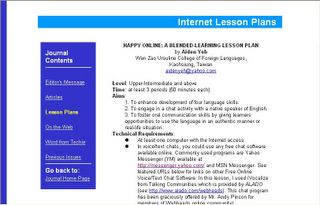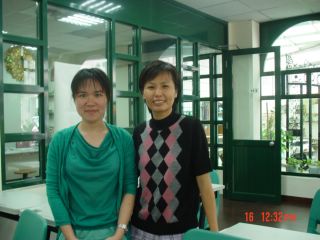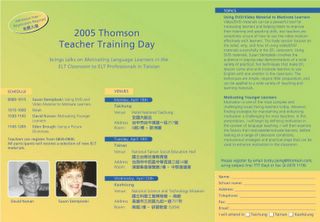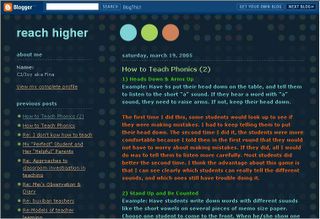Many thanks for your email, Arnold. :-) I was hoping that some of the teachers in this group would jump in and asnwer your question... I'll give it a shot and please feel free to share your ideas and opinions:
I would like to quote a text from productive learning environment,
"What is a learning environment? A learning environment is all the influences that surround a learner and cause him or her to be interested in learning.
In order to help learners learn, one of our main tasks is to create a good learning environment."
And in creating a good learning environment, it has to to be productive so learners could be productive, too. This can be done in many ways. One is through seating arrangements. I think Mei has a lot of experience on this matter :-) In addition, the classroom has pictures, teachers tell stories, classmates are friendly, student sing songs, interesting information, a caring teacher, and a comfortable classroom that surrounds the students. In a productive enviroment, students are excited about learning. They like working with friends, asking questions, and playing games.
There are a few factors that we need to consider in creating a productive learning environment. They are:
physical conditions: Is the classroom too hot? Too cold? Too dark? Is it clean and tidy? Are there enough desks and seats? Are they safe?
¡Pclassroom layout: Is there a chalkboard? Does the teacher use good teaching aids? Do the learners have books and paper and pencils? Are they easy to reach and use?
roles and rules: Do the learners know how to answer questions? Do they know how to ask to leave the room? Do they know the rules when working with other learners?
learners' relationships: Are the learners fighting? Do they like their teacher?
I think many of the conflicts that arise in language schools are more related to factors 3 and 4, roles and rules, and learners' relationship.
The issue on teaching style that was discussed here has something to do with factor 4. The student simply did not like the teacher. This issue was also brought up a few months ago by April when she moved to a new school. The students were reluctant to have a new teacher. There were attitude problems, but I think all this have been resolved, right April?
Acccording to the learning environment program,
Learners' relations with the teacher could be improved when teachers show or exhibits the following behaviors:
the teacher should model caring behaviour: being gentle, smiling, asking questions, helping learners if they have trouble, asking learners to help other learners.
learners should feel free to ask the teacher questions.
learners should feel free to talk to the teacher outside of the classroom.
learners should feel free to touch or hug the teacher if they wish. (This varies from culture to culture.)
I would appreciate comments from the teachers in this group. Do you agree or disagree with any or points made above? Any opinions, suggestions, clarifications?
I look forward to hearing from you.
I've got to go and attend the conference at Wen Zao where I hope to meet Joy.
Cheers everyone!
aiden
arnold wrote:
Hmm. I think you've got many different implicit questions here (no doubt
related here and there). I'd like to have a closer look at teaching and
learning styles perhaps and the implications thereof.
Obviously different teachers teach differently, they have their own
different styles - much in the same way that students also differ in the
ways they learn (best) or think they learn (best). Where they necessarily
meet (in the classroom situation), how much tolerance and patience is there
among both parties to "deal" with these differences. On either side there
will always be a degree of "otherness from how one would like to see things
done oneself" that cannot be ironed out for the sake of a theoretically
perfect match. It is an illusion to think this could be done and a mistake
probably that it should be done.
I think neither the teacher nor the students should be scrutinized too
heavily on this point. Maybe we should concentrate more on the learning
environment instead.
The richer and varied the learning environment that teachers and students
create together is, the less important it is to give a lot of attention to
the notion of different teaching and learning styles. I think that teaching
or learning to (assumed) styles can be so intrusive that it may stunt the
development of the various other learning powers that are always latent in
every student.
Assuming there is some sense in the above assumptions and I would like you
to bear with me on this point, one key question to start with would be:
What are charactistics of such a language learning environment?






















